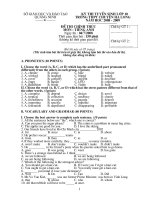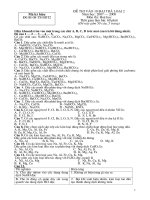- Trang chủ >>
- Lớp 9 >>
- Giáo dục công dân
DE THI TUYEN SINH 10 THANH HOA A
Bạn đang xem bản rút gọn của tài liệu. Xem và tải ngay bản đầy đủ của tài liệu tại đây (93.51 KB, 2 trang )
<span class='text_page_counter'>(1)</span>KỲ THI TUYỂN SINH LỚP 10 PTTH THANH HÓA – ĐỀ A PHẦN A: NGỮ ÂM (1.0 điểm) I. Chọn từ có phần gạch chân được phát âm khác so với các từ còn lại. 1. A. house B. horse C. hour D. hot 2. A. finished B. opened C. looked D. stopped II. Chọn từ có trọng âm chính rơi vào vị trí khác so với các từ còn lại. 1. A. again B. teacher C. happen D. table 2. A. lazy B. begin C. boring D. student PHẦN B: NGỮ PHÁP VÀ TỪ VỰNG (4.0 điểm) I. Cho dạng đúng của động từ trong ngoặc để hoàn thành các câu sau: 1. The children (clean).........the windows at the moment. 2. He used to (smoke)........10 cigarettes a day. 3. Our teacher asked us (prepare)......our lessons carefully. 4. I (go).....to the restaurant with my brother yesterday. 5. Look at those black clouds. It (rain)........ 6. They (not finish).....their homework yet. 7. If the weather is fine, we (go)......for a picnic. 8. This house (build)......over 100 years ago. II. Chọn một từ đúng trong ngoặc để hoàn thành các câu sau: 1. Nam is a student. .........school is in the countryside. (He / His) 2. She has been a teacher of English.....2010. (since / for) 3. Mai didn't go to school yesterday........she was ill. (because / although) 4. My sister speaks English very...... (fluent / fluently) 5. Tet is the most important.....in Vietnamese culture. (celebrate / celebration) 6. What's the name of the man.....gave us a gift. (who / whom) 7. You should write......ink, not with your pencil. (in / by) 8. I will play tennis tomorrow........I am busy. (unless / if) PHẦN C: ĐỌC HIỂU (2.5 điểm) I. Chọn từ thích hợp trong ô dưới đây điền vào mỗi chỗ trống để hoàn thành đoạn văn. However - with - save - Therefore - of - and In Western countries, electricity, gas and water are not luxuries but necessities. Companies now realise that consumers want products that will not only work effectively, but also......(1) money. For most American households, lighting accounts for 10 percent to 15 percent of the electricity bill. .....(2), this amount can be reduced by replacing an ordinary 100-watt light bulb with an energy-saving bulb. These bulbs use a quarter.....(3) the electricity of standard bulbs and last eight times longer. ......(4) consumers can save about US$21 per bulb. In Europe, there is a labeling scheme for refrigerators, freezers, washing machines.....(5) tumble dryers. The label tells the consumers how much energy efficiency each model has, compared......(6) other appliances in the same category.. II. Đọc đoạn văn và trả lời các câu hỏi. Thomas Edison was born on February 11, 1847 in Milan, Ohio. When he was at school, his teacher considered him to be a slow student. Because of hearing problems, Edison had difficulty in following the lessons. But with only three months of formal education he became of of the greatest inventors and industrial leaders in history. Edison's most famous inventions was the electric light bulb. He also invented the phonograph, and made improvements to the telegraph, telephone and motion picture technology. Edison had a special life. He married twice with five children. He loved books, had excellent memory, and always showed curiousity about science. Although he had hearing problems, he refused to have an operation for his deafness. He said that his silence helped him concentrate. He always worked very hard and only had only four hours of sleep every day. he used to say :Genius ws 1 percent inspiration and 99 percent perspirartion". When he died on October 18, 1931, he was still working on new ideas. 1. When was Thomas Edison born? 2. Did he had difficulty in hearing? 3. What was Edison's most famous invention? 4. How long did he use to work every day? PHẦN D: VIẾT (2.5 điểm) I. Chọn từ hoặc cụm từ gạch chân (A, B, C hoặc D) được sử dụng chưa đúng. 1. We decided (A) to go (B) for a picnic (C) despite it rained very (D) heavily. 2. Tom doesn't (A) like (B) durians, and (C) so does (D) his brother. II. Viết lại các câu sau sao cho nghĩa không thay đổi so với câu ban đầu, bắt đầu bằng từ gợi ý. 1. "I am very tired," Mrs. Nga said. - Mrs. Nga said that........................ 2. I don't have a new computer. - I wish.......................................... 3. He is too young to drive a car. - He isn't....................................... 4. It takes Minh 2 hours to do his homework every day. - Minh spends.............................. 5. Although his leg was broken, he mangaed to get out of the car. - In spite of.................................. II. Sắp xếp các từ, cụm từ thành câu hoàn chỉnh. 1. speaking / in / English / My teacher / class / suggested/. 2. when / go / to/ child / My father / he / used / fishing / was / a/. 3. enough / know / herself / it / were / If / she / to / the / Mary / could / machine / fix / about/. HẾT.
<span class='text_page_counter'>(2)</span> ĐÁP ÁN PHẦN A. NGỮ ÂM. I. 1. C 2. B II. 1. A 2. B PHẦN B. NGỮ PHÁP. I. 1. are learning 2. smoke 3. to prepare 4. went 5. is going to rain 6. have not finished 7. will go 8. was built II. 1. his – 2. since – 3. because – 4. fluently – 5. celebration – 6. who – 7. in - 8. unless PHẦN C. ĐỌC HIỂU. I. 1. save – 2. However – 3. Therefore – 4. and – 5. with II. 1 Thomas Edison was born on February 11, 1847. 2. Yes, he did. 3. His most famous invention was the electric light bulb. 3. He used to work about 20 hours every day. PHẦN D. VIẾT. I. 1. C – 2. C II. 1 Mrs. Nga said that she was tired. 2. I wish I had a new computer. 3. He isn’t old enough to drive a car. 4. Minh spends 2 hours doing his homework every day. 5. In spite of his broken leg, he managed to get out of the car. III. 1. My teacher suggested speaking English in class. 2. My father used to go fishing when he was a child. 3. If Mary were to know enough about the machine, she could fix it herself..
<span class='text_page_counter'>(3)</span>









